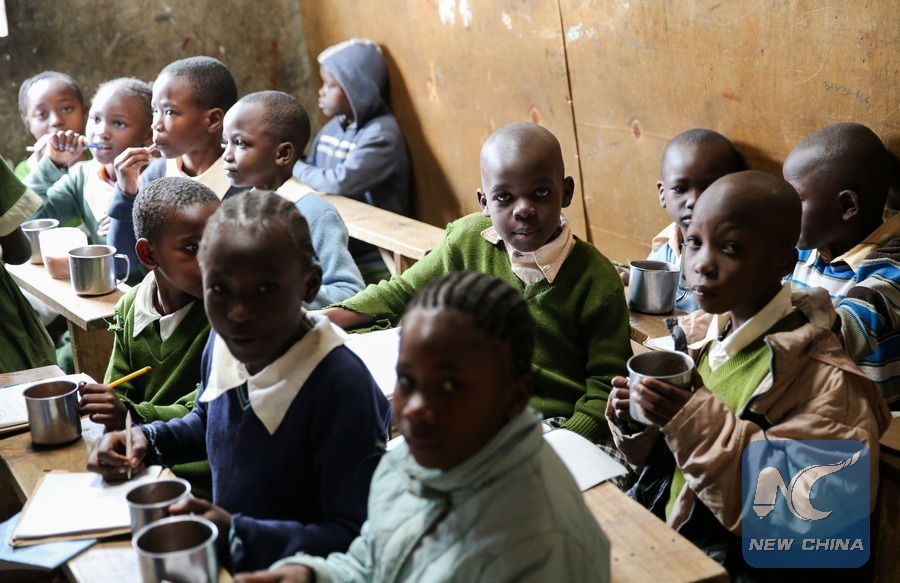
Students have congee as lunch at Chang Rong primary school, Mathare slums, Nairobi, Kenya, on Aug. 30, 2016. (Xinhua/Pan Siwei)
WINDHOEK, Sept. 29 (Xinhua) -- It is a morning break time at Havana Primary School, located in the poverty-stricken Havana informal settlement on the outskirts of Namibian capital Windhoek.
School children gather around a cook, who serves them the nutritious daily porridge, offered under the Namibian School Feeding Program.
For over 20 years, the school feeding program has proven to be a valuable catalyst in providing access to education for thousands of vulnerable children who otherwise might not have received this basic right.
"Sometimes I come from home without having eaten. I therefore always look forward to this daily meal as it helps me concentrate in class," said Selma, a ten-year-old pupil at Havana Primary School.
Most children in the Havana informal settlement come from impoverished homes, hence the school feeding program is helping Namibia retain learners and increase attendance.
Minister of Education, Arts and Culture Katrina Hanse-Himarwa said that the Ministry has developed different policies to ensure provision, protection and participation of children educational activities as well as in other matters that concern them, including the school feeding program.
"Ministry introduced a National School Feeding Program (NSFP) to schools with vulnerable and orphan learners," said the minister.
"The NSFP provides meals to these learners, thus ensuring that they have enough energy to participate in school activities. This also encourages learners to attend school regularly," she said while opening the National Symposium on Convention of the Child Rights, School and Classroom Management currently underway in Ongwediva, northern Namibia.
According to the minister, the Namibian Constitution entitles all children in Namibia to free primary and secondary education.
"Indeed, education is considered so fundamental a right - and duty - of every citizen that attendance to age 16, or the completion of primary school, is compulsory. The right to education does not end by being guaranteed a seat in a classroom," she added, citing the school feeding as one of the key policies being implemented to keep learners in school.
More than 310,000 pre-primary and primary school learners are benefiting from a daily nutritious meal at school consisting of ingredients: maize, protein, sugar and salt, said Hanse-Himarwa.
The parents are relieved that the daily school meal is offered at school. "I am unemployed, I can't afford to cater for required three meals for my child. I am relieved to know that my child will not starve while at school," said Aina Mweendeleli, a parent benefiting through the school feeding program in Windhoek.
Back at the school, as Selma resumes for class from her morning break, "I will be able to concentrate and no longer worry about my growling stomach," she said.

